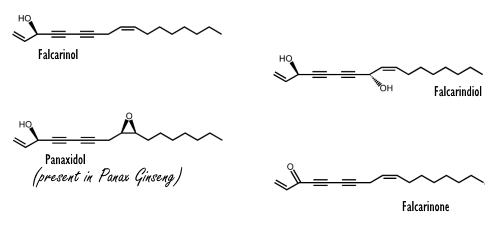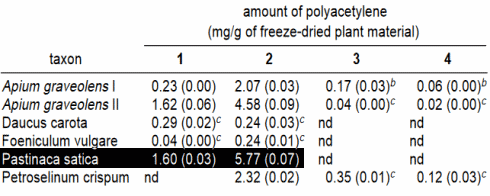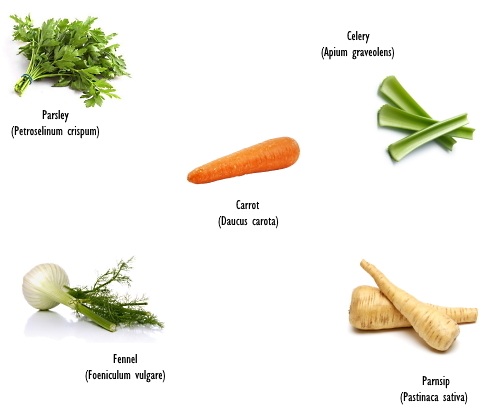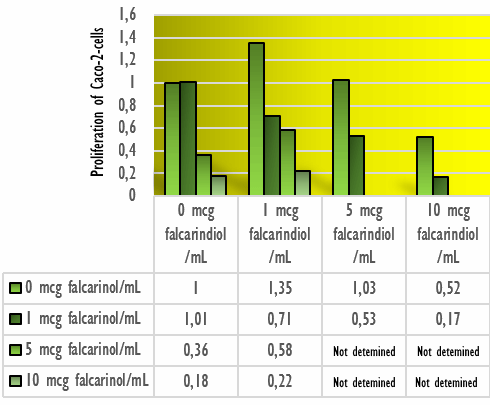Polyacetylenes, the lesser known cancer inhibitors in carrot, celery and parsnip
Carrots protect against prostate cancer, breast cancer and undoubtedly more types of cancer. That's because of the carotenoids in carrots, we thought - until a reader sent us a few studies we didn't know yet. We now know that there are even more cancer inhibitors in carrots and related vegetables such as sellerie, parsley, fennel and parsnip. One of them is falcarinol.
Polyacetylenes
Falcarinol is a polyacetylene or, more precisely, an aliphatic C17-polyacetylene. Polyacetylenes are found in relatively large amounts in vegetables from the Apiaceae family, such as the old-fashioned carrot. Moreover, unlike many other interesting bioactive substances, their bioavailability is pretty good.
[FONT="]
[/FONT]

[FONT="]
[/FONT]
Presence in vegetables
In 2005 Austrian researchers published a study in which they determined the concentration of falcarinol [1], falcarindiol [2] and 2 other polyacetylenes in 2 types of sellerie [Apium graveolens I and II], carrot [Daucus carota], fennel [Foeniculum vulgare] , parsnip [Pastinaca sativa] and parsley [Petroselinum crispum].
[FONT="]
[/FONT]


[FONT="]
[/FONT]
At first glance, parsnip was the best source of polyacetylenes, but the varying concentrations in the 2 types of celery suggest that there can be quite a bit of variation within one variety of vegetables.We will spare you a long agricultural technical story, but based on the table below, we expect the concentration of polyacetylenes in organically grown crops to be significantly higher than in regular products.
Conclusion
"If these findings can be verified, celery, parsley, and parsnip, which contain high amounts of bioactive polyacetylenes, will become promising ingredients of a diet aimed at cancer prevention", write the Austrians.
Anti-cancer effect
In 2009, Danish scientists at Aarhus University published an in vitro study in which they exposed Caco-2 colon cancer cells to falcarinol, falcarindiol, panaxydol and falcarinone. [Agric Food Chem. 2009;57(18):8290-6.]
In the low concentrations expected in the body of people who eat carrots, parsnips and related vegetables, falcarinol was the most powerful cancer inhibitor. Falcarindiol, like the other polyacetylenes tested, also enhanced the anti-cancer effect of falcarinol.
[FONT="]
[/FONT]

[FONT="]
[/FONT]
Another conclusion
"The present study demonstrates that aliphatic C17-polyacetylenes are potential anticancer principles of carrots and related vegetables and that synergistic interaction between bioactive polyacetylenes may be important for their bioactivity," write the Danes.
Source:
J Agric Food Chem. 2005;53(7):2518-23.
Carrots protect against prostate cancer, breast cancer and undoubtedly more types of cancer. That's because of the carotenoids in carrots, we thought - until a reader sent us a few studies we didn't know yet. We now know that there are even more cancer inhibitors in carrots and related vegetables such as sellerie, parsley, fennel and parsnip. One of them is falcarinol.
Polyacetylenes
Falcarinol is a polyacetylene or, more precisely, an aliphatic C17-polyacetylene. Polyacetylenes are found in relatively large amounts in vegetables from the Apiaceae family, such as the old-fashioned carrot. Moreover, unlike many other interesting bioactive substances, their bioavailability is pretty good.
[FONT="]
[/FONT]

[FONT="]
[/FONT]
Presence in vegetables
In 2005 Austrian researchers published a study in which they determined the concentration of falcarinol [1], falcarindiol [2] and 2 other polyacetylenes in 2 types of sellerie [Apium graveolens I and II], carrot [Daucus carota], fennel [Foeniculum vulgare] , parsnip [Pastinaca sativa] and parsley [Petroselinum crispum].
[FONT="]
[/FONT]


[FONT="]
[/FONT]
Conclusion
"If these findings can be verified, celery, parsley, and parsnip, which contain high amounts of bioactive polyacetylenes, will become promising ingredients of a diet aimed at cancer prevention", write the Austrians.
Anti-cancer effect
In 2009, Danish scientists at Aarhus University published an in vitro study in which they exposed Caco-2 colon cancer cells to falcarinol, falcarindiol, panaxydol and falcarinone. [Agric Food Chem. 2009;57(18):8290-6.]
In the low concentrations expected in the body of people who eat carrots, parsnips and related vegetables, falcarinol was the most powerful cancer inhibitor. Falcarindiol, like the other polyacetylenes tested, also enhanced the anti-cancer effect of falcarinol.
[FONT="]
[/FONT]

[FONT="]
[/FONT]
Another conclusion
"The present study demonstrates that aliphatic C17-polyacetylenes are potential anticancer principles of carrots and related vegetables and that synergistic interaction between bioactive polyacetylenes may be important for their bioactivity," write the Danes.
Source:
J Agric Food Chem. 2005;53(7):2518-23.
